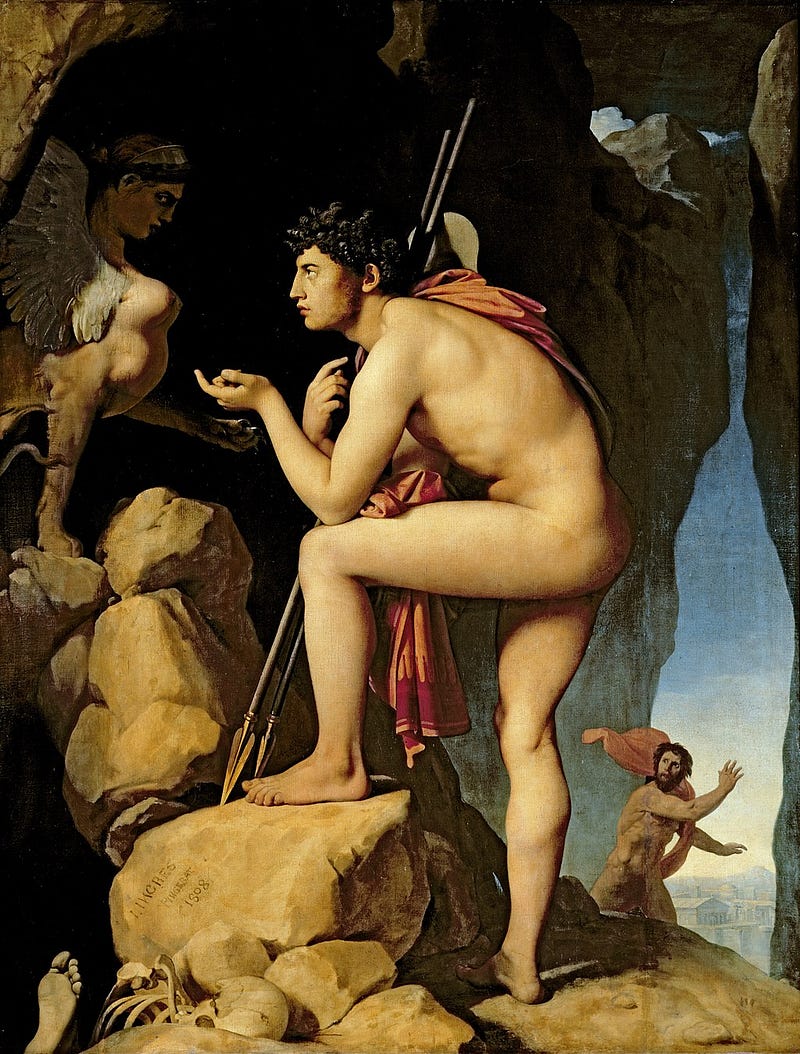# Exploring Hubris and Mortality in 'Macbeth' and Oedipus
Written on
Chapter 1: The Poetic Depth of Macbeth
In the well-known words of Macbeth, he laments:
“Seyton! — I am sick at heart,
When I behold — Seyton, I say! — This push
Will cheer me ever, or disseat me now.
I have lived long enough: my way of life
Is fall’n into the sere, the yellow leaf;
And that which should accompany old age,
As honour, love, obedience, troops of friends,
I must not look to have; but, in their stead,
Curses, not loud but deep, mouth-honour, breath,
Which the poor heart would fain deny, and dare not. Seyton!”
—William Shakespeare, Macbeth, Act V, Scene III
In my younger years, I found this soliloquy rather unconvincing, seemingly at odds with Macbeth's relentless pursuit of power. However, now that I am at an age where I can relate to the “yellow leaf,” I find it deeply profound and moving.
This moment encapsulates Shakespeare’s poetic prowess, portraying the melancholic state of Macbeth as he realizes his reign is drawing to a close. Interestingly, there is an element of sympathy for this Machiavellian figure, which raises questions about our capacity to empathize with such evil. Shakespeare navigates this moral complexity with finesse.
At its core, this passage serves as a reminder of the natural order and the temporal nature of human existence:
“To everything turn, turn, turn
There is a season turn, turn, turn
And a time to every purpose under heaven…
A time to gain, a time to lose
A time to rend, a time to sew
A time for love, a time for hate
A time for peace, I swear it’s not too late”
—The Byrds, Turn! Turn! Turn! (To Everything There Is a Season)
Yet, beyond the beautifully constructed verses lies a profound reflection on the human condition—an aging body and waning ambition, intertwined with the cyclical essence of life and death, foreshadowing Macbeth's downfall at Birnam Wood.
Macduff, born through a cesarean section, exists almost outside this natural order. The Witches have warned Macbeth to “beware Macduff,” but they paradoxically assure him that “none of woman born / Shall harm Macbeth,” leading him to believe that he is invincible. This hubris, while misguided, seems justified in his mind.
Having recently turned 60, I now view the Shakespearean characters I once dismissed with newfound respect. Macbeth’s speech resonates with me on a deeper level than ever before.
Macbeth and Lady Macbeth staked everything on their bloody ambitions. Now, Macbeth stands alone, grappling with the consequences of their quest for power without his partner, who has succumbed to madness, haunted by imaginary blood on her hands.
Lady Macbeth's descent into madness is a manifestation of her conscience, as she faces judgment from herself and a higher moral order. Regardless, their ambition to seize the throne cannot be easily condemned. In a world where ambition drives one to great heights, what is the alternative?
Ironically, Macbeth expresses weariness with ambition, recognizing that usurping the natural succession has robbed him of the rightful aging that should accompany his status. Instead of empowering him, his violent ascension to the throne has left him merely pretending at kingship.
The vivid metaphor of seasonal change—the shifting colors of leaves—reflects human aging. For Macbeth, the cycle of life begins with birth, which ultimately becomes his undoing, overshadowing his transformation into “the yellow leaf” of old age.

Chapter 2: Oedipus and the Riddle of Existence
The Riddle of the Sphinx poses a grim challenge, for those unable to answer it meet their demise:
“What goes on four feet in the morning, two feet at noon, and three feet in the evening?”
The answer? Man. In the morning of life, a baby crawls on all fours; in adulthood, he walks upright; and in old age, he leans on a cane—three feet.
Oedipus's correct answer symbolizes the transition from ancient religious beliefs, as embodied by the Sphinx, to the establishment of new civic practices represented by the Olympian gods. This narrative illustrates three stages of human transformation.
In contrast, Shakespeare's era presents a natural cycle of growth and decay, reflecting the human experience of development and decline. This cyclical idea heralds the scientific changes that began to emerge in Europe during the late 17th century.
Macbeth stands at the intersection of Oedipus’s hubris and Protagoras’s assertion that “Man is the measure of all things.” This notion will ultimately shape humanity's scientific endeavors, while Macbeth embodies the recognition of natural cycles that, when disrupted, lead to disastrous outcomes.
Macduff, as Macbeth's adversary, can be seen as a triumph of scientific rationality—a product of cesarean birth, symbolizing the obsolescence of human and natural cycles in a world increasingly dominated by scientific exploration.
In the first video, Macbeth Context: Hubris and Greek Tragedy, the discussion delves into how Shakespeare's portrayal of Macbeth resonates with themes of hubris found in Greek tragedies, particularly the character's moral decline and existential struggles.
The second video, Aristotelian Terminology in Macbeth - GCSE Revision Analysis, provides an analysis of the Aristotelian elements present in Macbeth, exploring how these concepts enhance our understanding of the play's characters and themes.
Sadie Seroxcat